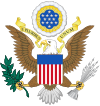
Back الغرب الأمريكي القديم Arabic Llonxanu Oeste AST Vəhşi Qərb Azerbaijani Дзікі Захад Byelorussian Дзікі Захад BE-X-OLD Див запад Bulgarian Far West Catalan ڕۆژاوای ئەمریکای کۆن CKB Divoký západ Czech Y Gorllewin Gwyllt Welsh
 The cowboy, the quintessential symbol of the American frontier. Photo by John C. H. Grabill, c. 1887. | |
| Date | 17th to early 20th century
|
|---|---|
| Location |
|
| This article is part of a series on the |
| History of the United States |
|---|
 |
The American frontier, also known as the Old West, and popularly known as the Wild West, encompasses the geography, history, folklore, and culture associated with the forward wave of American expansion in mainland North America that began with European colonial settlements in the early 17th century and ended with the admission of the last few contiguous western territories as states in 1912. This era of massive migration and settlement was particularly encouraged by President Thomas Jefferson following the Louisiana Purchase, giving rise to the expansionist attitude known as "manifest destiny" and historians' "Frontier Thesis". The legends, historical events and folklore of the American frontier, known as the frontier myth, have embedded themselves into United States culture so much so that the Old West, and the Western genre of media specifically, has become one of the defining features of American national identity.[8]
- ^ Cite error: The named reference
:3was invoked but never defined (see the help page). - ^ "Population, Plate No. 3". United States Bureau of the Census. Statistical Atlas of the United States, 1920: 9. June 7, 1924.
- ^ Brian W. Dippie, "American Wests: historiographical perspectives." American Studies International 27.2 (1989): 3–25.
- ^ "The American West, 1865–1900 | Rise of Industrial America, 1876–1900 | U.S. History Primary Source Timeline | Classroom Materials at the Library of Congress". Library of Congress, Washington, D.C. Retrieved January 7, 2023.
- ^ Milner, Clyde A.; O'Connor, Carol A.; Sandweiss, Martha A. (1994). The Oxford history of the American West. New York: Oxford University Press. pp. 326, 412–413, 424, 472. ISBN 978-0195059687.
- ^ Nash, Gerald D. (1980). "The Census of 1890 and the Closing of the Frontier". The Pacific Northwest Quarterly. 71 (3): 98–100. JSTOR 40490574.
- ^ Lang, Robert E.; Popper, Deborah E.; Popper, Frank J. (1995). ""Progress of the Nation": The Settlement History of the Enduring American Frontier". Western Historical Quarterly. 26 (3): 289–307. doi:10.2307/970654. JSTOR 970654.
- ^ Magazine, Smithsonian; Woodard, Colin. "How the Myth of the American Frontier Got Its Start". Smithsonian Magazine. Retrieved January 20, 2025.